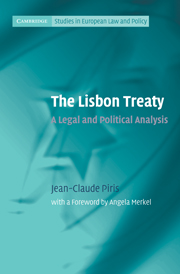Book contents
- Frontmatter
- Contents
- List of boxes
- Foreword by Angela Merkel, Chancellor of the Federal Republic of Germany
- Acknowledgements
- Table of cases
- List of abbreviations
- Introduction
- I The origins and birth of the Lisbon Treaty
- II General provisions
- III Democracy
- IV Fundamental Rights
- V Freedom, Security and Justice
- VI Institutions
- VII External affairs
- VIII Financial, economic, social and other internal affairs
- Conclusion: the Lisbon Treaty and beyond
- Appendixes
- References
- Index
- References
VII - External affairs
Published online by Cambridge University Press: 05 June 2012
- Frontmatter
- Contents
- List of boxes
- Foreword by Angela Merkel, Chancellor of the Federal Republic of Germany
- Acknowledgements
- Table of cases
- List of abbreviations
- Introduction
- I The origins and birth of the Lisbon Treaty
- II General provisions
- III Democracy
- IV Fundamental Rights
- V Freedom, Security and Justice
- VI Institutions
- VII External affairs
- VIII Financial, economic, social and other internal affairs
- Conclusion: the Lisbon Treaty and beyond
- Appendixes
- References
- Index
- References
Summary
Both in the 2002–3 Convention and in the 2003–4 IGC, the ambition was to take a major qualitative step forward in the field of external affairs. The aim was to make the Union more ‘present in the world’, as the European Council had requested in the 2001 Laeken Declaration. This was to be achieved by improving the functioning of the CFSP, as well as the consistency between the different areas of EU external policy: CFSP, trade, development, humanitarian aid and other sectoral external policies in environment, transport and so on, essentially through the establishment of new institutional tools.
External affairs before the Lisbon Treaty
The origins and scope of the external competence of the Community
In the 1957 Rome Treaty, the EC competence in external affairs was purely economic, and in particular linked to the fact that the EC was first created as a customs union, with a common customs tariff. As international trade developed, and the EC progressively liberalised its internal trade and made use of its internal competences to create its internal market, with free movement of goods, services, capital and persons and harmonised internal rules, the corresponding external competences also developed. This was necessary to avoid the possibility that, by concluding international agreements on matters covered by internal EC rules, Member States would affect these rules or impede their development.
- Type
- Chapter
- Information
- The Lisbon TreatyA Legal and Political Analysis, pp. 238 - 287Publisher: Cambridge University PressPrint publication year: 2010



